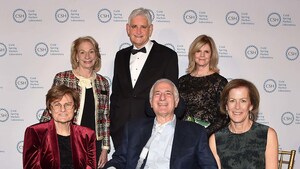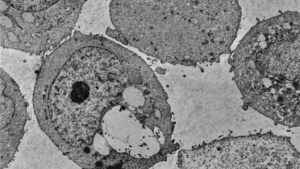CSHL's Dr. Leemor Joshua-Tor is elected to The National Academy of Sciences
WASHINGTON and COLD SPRING HARBOR, N.Y., May 2, 2017 /PRNewswire/ -- CSHL Professor Leemor Joshua-Tor, Ph.D., a structural biologist whose work is known and respected worldwide, has been elected to The National Academy of Sciences (NAS). Dr. Joshua-Tor, who since 2008 has been an Investigator of the Howard Hughes Medical Institute, joins a new class whose election was announced by the Academy today. NAS members on the CSHL faculty include President and Professor Bruce Stillman and Professor Michael Wigler.
"Leemor Joshua-Tor has used structural biology to provide valuable insight into some of the most fundamental aspects of how our cells work, including how the genome is copied and how gene expression is controlled," President Stillman commented. "Her election today recognizes this outstanding research and I congratulate her. She brings great credit to Cold Spring Harbor Laboratory."
Joshua-Tor's laboratory studies the molecular basis of nucleic acid regulatory processes, RNA interference (RNAi) and DNA replication in particular. They use the tools of structural biology, biochemistry and biophysics to study proteins and protein complexes associated with these processes to elucidate how they work. X-ray crystallography, electron microscopy and other structural techniques enable her lab to obtain the three-dimensional structures of these molecular machines. Biochemistry, biophysics and molecular biology allow them to study properties that can be correlated to their function and biology.
"My election to the National Academy of Sciences is a great honor," said Joshua-Tor. "I am lucky to have had wonderful colleagues and collaborators throughout my career, to have the support of the Howard Hughes Medical Institute, and to be part of the very stimulating environment at Cold Spring Harbor Laboratory."
Joshua-Tor is well known for her work in revealing structures involved in the gene-silencing mechanisms of RNAi. In 2004, she and colleagues used x-ray crystallography to identify a then enigmatic protein called Slicer at the heart of the RNAi machinery. The appropriately named enzyme, a member of a family of proteins called Argonaute, acts to cleave messenger-RNAs that have paired with small interfering RNAs, effectively preventing a gene's message from being expressed.
After solving for the structure of Argonaute, Joshua-Tor performed critical experiments with then CSHL Professor Gregory Hannon, proving that Argonaute was the only protein required for Slicer activity, and shedding light on a structural feature of the protein—a groove in its topography—into which a short RNA and messenger-RNA can nestle when the two are paired, prior to cleaving.
Following her discovery of Slicer, Joshua-Tor used structural biology and molecular biology tools to determine the structure of a protein called E1 that is found in papillomavirus, a DNA tumor virus that causes cervical cancer. This work was part of a larger thrust in her research to understand the molecular motors involved in replication initiation. They have also been examining the eukaryotic machinery with the Origin Recognition Complex (ORC) as the centerpiece of these studies.
Leemor Joshua-Tor was born in Israel and trained at Tel-Aviv University, where she earned a B.Sc. in chemistry, and at the Weizmann Institute of Science in Rehovot, where she earned a Ph.D. in chemistry. She was a postdoctoral fellow at the California Institute of Technology prior to joining the CSHL faculty as an assistant investigator. She was named associate professor at CSHL in 1999 and professor in 2005. In April 2017 she was elected to The American Academy of Arts and Sciences.
A gifted mentor, Dr. Joshua-Tor was named co-director of the undergraduate research program at the Watson School of Biological Sciences in 2001, and in 2007 was named the school's dean, succeeding Dr. Lilian Clark. She held the post of dean for five years before returning to her laboratory full-time.
About Cold Spring Harbor Laboratory
Founded in 1890, Cold Spring Harbor Laboratory has shaped contemporary biomedical research and education with programs in cancer, neuroscience, plant biology and quantitative biology. Home to eight Nobel Prize winners, the private, not-for-profit Laboratory employs 1,100 people including 600 scientists, students and technicians. Visit www.cshl.edu
SOURCE Cold Spring Harbor Laboratory
Related Links
WANT YOUR COMPANY'S NEWS FEATURED ON PRNEWSWIRE.COM?
Newsrooms &
Influencers
Digital Media
Outlets
Journalists
Opted In






Share this article